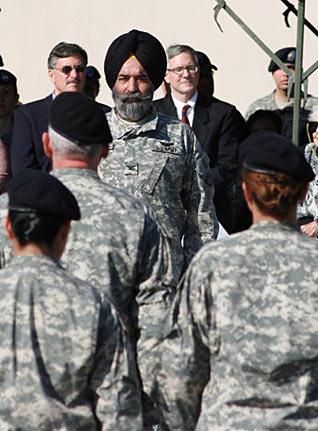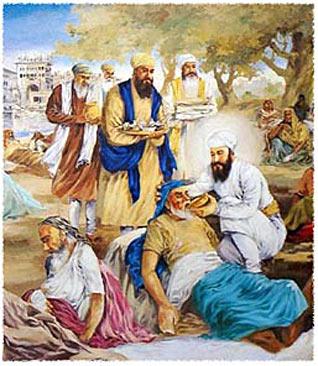Columnists
Terms of Engagement
by I. J. SINGHReligions become universal when they speak of the human condition and our connectivity that transcends racial, national, ethnic, gender, psychosocial, and economic barriers. When religions weigh in on our inequities in these matters, it makes them eternal. Then they are no longer just for the time or place when they were first enunciated.
It is true that most religions, much of the time, teach about a reality that lies beyond our words and concepts and, from this understanding, derive a lifestyle that is harmonious, peaceful, tolerant and progressive. Most religions have also discovered that defining a precise code of ethical conduct where every "t" is crossed and every "i" is dotted is a minefield, invariably leading to heightened, even violent disagreement between neighbors.
The New York Times of February 18, 2007 featured an article that started with the August 2006 survey by the Pew Forum on Religion and Public Life. The survey had asked American churchgoers to identify issues that their clergy talked about in their sermons. Many of the topics had little to do with heaven, hell or everlasting life; in fact, they addressed matters with more immediate concerns.
Ninety-two percent said their clergy delivered sermons on hunger and poverty, 59 percent on abortion, Iraq rated 53 percent, same sex issues were the subject for 52 percent, environment 48 percent, evolution and intelligent design drew a rating of 40 percent, death penalty claimed the attention in 40 percent, 24 percent reported that stem cell research was talked about, while immigration was the subject of clerical preaching for 21 percent of church-going Americans.
I am fully aware that this brief summary is at best incomplete. It doesn't mention Jews; I am sure they do not miss out on such topics. This quick recount also doesn't tell us about the variety within the Christian experience - from the most conservative fundamentalists to the most liberal humanists. But that kind of esoteric detail, important as it is, is not my focus today. What I wish to highlight is that churches are exploring issues that impact the lives of their flock and the structure of society.
These are matters of considerable importance in today's world; many have changed with time and will continue to evolve. Some of them, like stem cell research or the Iraq war, were of no concern only a few years ago, while others, like hunger and poverty, have been with us forever.
For instance, since they are an integral part of the greater American milieu, North American Sikhs would share the concerns of the larger society, specifically immigration, as well as hunger and poverty. In addition, however, as a relatively new visible minority, Sikhs would also have a stake in job rights, social and legal equality under the law, matters of interfaith relations, as well as the sequelae of 9/11. Not that they are unique to Sikhs, but issues such as alcoholism and spousal abuse would also demand attention. How to preserve, nurture and transmit our identity and heritage would unquestionably remain on the front burner.
Yes, religions do speak of eternal values that give us an ethical framework in which to navigate our complex lives. But the Pew survey tells us that mundane matters of life cannot be ignored. Our eternal values must engage with the everyday concerns that drive our ordinary but often desperate lives. I know that such issues evolve and mutate, our knowledge base and technical skills, too, progress, and answers change. And surely, sometimes we will make mistakes and rue the path we have chosen.
Religions need to provide us a guiding process, not give us answers etched in stone. It is then that religions work, as T.S. Eliot says, "to apprehend the point of intersection of the timeless with time." What you never want to do is to disconnect the evergreen teachings of religious truths from our contemporary life. If that happens, truth becomes empty rhetoric, while practices are reduced to meaningless, fossilized rituals.
But then, why is it that I have never ever heard any conversation on any of these issues in any gurdwara? Are we Sikhs living in a different world?
Top Photo: Col. Arjinderpal Singh Sekhon taking over command of the US Army's 349th Combat Support Hospital, Los Angeles on January 21, 2007.
Thumbnail Photo: Amrit Kaur speaking at an inter-faith celebration of Martin Luther King, Jr., in Washington, D.C. Courtesy - SikhNN.com and the Gurdwara Guru Gobind Singh Foundation.




